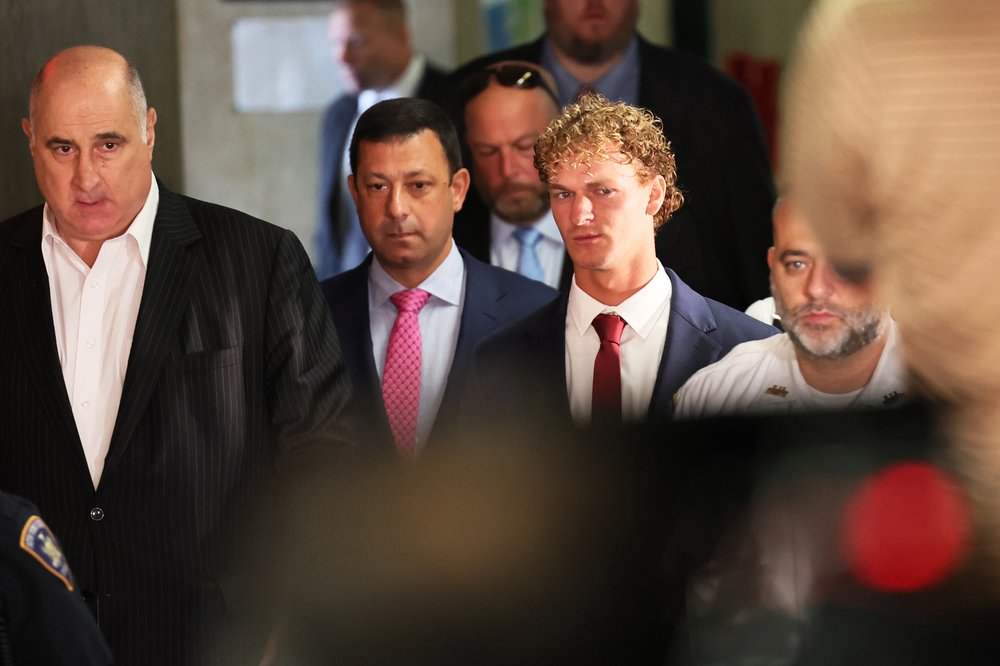Trial begins for Daniel Penny, accused in Jordan Neely's chokehold death on NYC subway
Nov. 1, 2024, 8:09 a.m.
The case has been deeply divisive for New Yorkers, whose opinions on it are closely tied to their thoughts on subway crime, mental health and homelessness.

Daniel Penny went “way too far” when he wrapped his arm around Jordan Neely’s neck, pulled him to the dirty floor of an uptown F train and continued to squeeze for about six minutes, killing him, Assistant District Attorney Dafna Yoran said in an opening statement in Penny’s criminal trial in Manhattan on Friday.
Yoran told jurors that Penny, then a 24-year-old former Marine studying architecture, started out with “laudable intentions” to protect fellow passengers after Neely boarded the train and began to yell threats. But she said Penny’s actions became reckless as he continued to hold onto Neely’s neck — even after the train doors opened and scared riders were able to flee, and even after Neely’s body went limp.
“By the time he let go, Mr. Neely was in the final stages of the dying process,” Yoran said
Penny has pleaded not guilty to manslaughter and criminally negligent homicide for choking Neely, a 30-year-old homeless man with mental illness, in May 2023.
Penny has said that he was trying to subdue Neely, not kill him.
A video that captured part of the chokehold and its aftermath went viral and became a litmus test for New Yorkers’ feelings about mental illness, homelessness and crime on the subway. Many viewers also noted that Penny is white and Neely was Black — a factor that Penny has said played no role in his decision to choke Neely.
Yoran said in her opening statement that they would watch the video of the incident and that it would be “the most critical piece of evidence at this trial.”
“You will watch, members of the jury, in real time, as the defendant bears down on Mr. Neely’s neck,” she said. “You will see Mr. Neely’s life being snuffed out before your very eyes.”
The assistant district attorney said Neely was hungry, thirsty, homeless and on synthetic cannabinoids when he boarded the uptown F train. She said New Yorkers walk past people like him every day.
“We train ourselves not to engage. Not to make eye contact. To pretend people like Jordan Neely are not there,” Yoran said. “But on Monday, May 1, 2023, Jordan Neely demanded to be seen.”
Penny, she said, took it upon himself to take Neely down “without hesitation” and was reckless with his life.
“The evidence will show that the defendant was so reckless with Mr. Neely’s life because he didn’t recognize his humanity,” Yoran said.
Penny sat on the other side of the courtroom in a navy blue suit, his head tilted toward the jury.
In the defense's opening statements, attorney Thomas Kenniff, described Penny as a middle-class kid who grew up in an ordinary suburb on Long Island. He said that Penny enlisted in the military after high school to serve his country, see the world, and earn money to go to college. He also said Penny had received “a bit” of martial arts training years earlier in the Marines.
On May 1, 2023, Kenniff said, Penny was on his way to the gym to swim laps after class at City Tech in Brooklyn. As the doors began to close at the Second Avenue subway stop, he said, Neely boarded, threw his jacket onto the floor and demanded food, drinks and money. He said Neely balled his fists and lunged at passengers as they flooded toward the far end of the train car or cowered in their seats. Neely also said he was willing to take what he wanted if the other riders wouldn’t give it to him and that he was willing to die or take a life sentence, Kenniff told jurors.
Penny and others on the subway were “petrified,” his attorney said, adding that Penny decided to put Neely in a chokehold after he saw a mother hiding her son behind a stroller and heard Neely say, “I will kill.”
“When Jordan Neely threatened to kill, there was only one thing Daniel Penny could do,” the attorney said.
Kenniff said Penny’s decision to put Neely in a chokehold doesn’t mean he devalued human life. He said Penny’s actions reflected just the opposite and that he was trying to restrain Neely to protect the lives of everyone else on the train.
In that moment, the lawyer said, Penny “could look away and pray,” or he could summon the courage to “protect those not able to protect themselves.”
Penny’s lawyer cast doubt on the cause of Neely’s death, which prosecutors and the medical examiner’s office say was compression of his neck. Kenniff said his client didn’t continuously squeeze Neely’s neck and that he only held on for as long as he did because Neely was “aggressively resisting.” He also suggested that Neely could have died from the “excitement” of the incident or because he had sickle cell trait — a condition the prosecutor said was “largely benign.”
After both sides presented their openings, prosecutors showed body-worn camera video of the first officers running into the Broadway-Lafayette station and onto the train, where Neely lay motionless on the floor. Jurors watched as officers checked Neely’s wrist for a pulse, rubbed his chest, administered overdose reversal drugs and then took turns pushing on his chest. One after the next tried to revive him.
In the back of the courtroom, Neely’s father, Andre Zachery, hunched over, sniffling with a crumpled tissue in his hand.
The assistant district attorney asked one of the officers who responded that day, Teodoro Tejada, whether the chest compressions worked.
“No,” he said.
This story has been updated with additional information.
‘Most New Yorkers’ have opinions on subway crime. Does that affect Daniel Penny’s jury? Jury will hear what Daniel Penny told NYPD after fatally choking Jordan Neely in subway